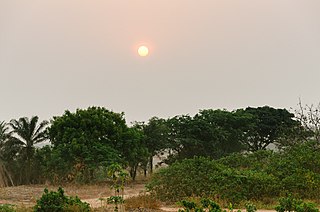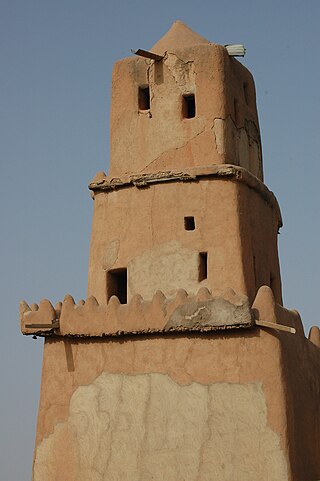
The Fulani War of 1804–1808, also known as the Fulani Jihad or Jihad of Usman dan Fodio, was a military conflict in present-day Nigeria and Cameroon. The war began when Usman Dan Fodiyo, a prominent Islamic scholar and teacher, was exiled from Gobir by King Yunfa, one of his former students.

Dire Dawa is a city in eastern Ethiopia near the Oromia and Somali Region border and one of two chartered cities in Ethiopia. Dire Dawa alongside present-day Sitti Zone were apart of the Dire Dawa autonomous region stipulated in the 1987 Ethiopian Constitution until 1993 when it was split by the federal government into a separately administered chartered city. This was due to the ongoing clashes between the OLF and IGLF and prevented any further escalation.

Lokoja is a city in Nigeria. It lies at the confluence of the Niger and Benue rivers and is the capital city of Kogi State. While the Yoruba (Oworo), Bassa Nge and Nupe are indigenous to the area, other ethnic groups of Nigeria, including the Kupa-Nupe, Hausa, Ebira, Igala, Igbo, Bini/Edo, and Tiv have recently established themselves. Projected to be the third fastest growing African continent city between 2020 and 2025, with a 5.93% growth. It was listed a second class township by the 1917 township ordinance of the colonial administration. This shows that Lokoja is an old city.

Maradi is the second largest city in Niger and the administrative centre of Maradi Region. It is also the seat of the Maradi Department and an Urban Commune.

The Eastern Region was an administrative region in Nigeria, dating back originally from the division of the colony Southern Nigeria in 1954. Its first capital was Calabar. The capital was later moved to Enugu and the second capital was Umuahia. The region was officially divided in 1967 into three new states, the East-Central State, Rivers State and South-Eastern State. East-Central State had its capital at Enugu, which is now part of Enugu State.

The Region of Maradi is one of seven Region of Niger. It is located in south-central Niger, east of the Region of Tahoua, west of Zinder, and north of the Nigerian city of Katsina. The administrative centre is at Maradi. The population of the Region is predominantly Hausa.
Yauri is an emirate in Nigeria's Kebbi State, occupying the Yauri Local Government Area. Today, Yauri is one of the smallest historical emirates in Northern Nigeria. In 1972, the population was about 112,000 people inhabiting a land area of about 1,306 square miles (3,380 km2) and scattered over six major districts.
The city of Gusau, located in northwestern Nigeria, is the capital of Zamfara State. It is also the name of the state's Local Government Area (LGA), which has an area of 3,364 km (2,090 mi)² and a population of 383,162 as of the 2006 census.

Igboland, also known as Southeastern Nigeria, is the indigenous homeland of the Igbo people. It is a cultural and common linguistic region in southern Nigeria. Geographically, it is divided by the lower Niger River into two sections: an eastern and a western one. Its population is characterised by the diverse Igbo culture and the speakers of equally diverse Igbo languages.
Mani is a Local Government Area in Katsina State, Nigeria. Its headquarters are in the town of Mani. Mani town was established more than 600 years ago while the Local Government was created in 1976 after the enactment of Local Government reforms act. Three other Local Governments were however carved from the Old Mani Local Government Area.
Faskari is a town and Local Government Area (LGA) in Katsina State, northern Nigeria. The population of the LGA was 125,181 as of 2003. The current Sarki (Emir) is Eng. Aminu Tukur Saidu, and the Executive Chairman is Honourable Bala Faskari, an APC member.

The Hausa are a native ethnic group in West and Central Africa. They speak the Hausa language, which is the second most spoken language after Arabic in the Afro-Asiatic language family. The Hausa are a diverse but culturally homogeneous people based primarily in the Sahelian and the sparse savanna areas of southern Niger and northern Nigeria respectively, numbering around 53 million people with significant indigenized populations in Benin, Cameroon, Ivory Coast, Chad, Sudan, Central African Republic, Republic of the Congo, Togo, Ghana, Eritrea, Equatorial Guinea, Gabon, Senegal and the Gambia.

The Gobarau Minaret is a 15-metre (50 ft) minaret located in the center of the city of Katsina, northern Nigeria. As an early example of Muslim architecture in a city known as a theological center, the tower has become a symbol of the city.
The Nyingwom or Kam language is a Niger-Congo language spoken in eastern Nigeria. Blench (2019) lists speakers residing in the main villages of Mayo Kam and Kamajim in Bali LGA, Taraba State. Lesage reports that Kam is spoken in 27 villages of Bali LGA.
Gaya is a Local Government Area in Kano State, Nigeria. Its headquarters are in the town of Gaya in the north of the area.
Danja is a Local Government Area in Katsina State, Nigeria. Its headquarters are in the town of Danja.
Lere is a Local Government Area and town in Kaduna Kaduna State of Nigeria. Lere town is located geographically at the latitude 10 degrees 39 North and longitude 8 degrees 57 East. It is the headquarters of the Lere Emirate. The town and its environs has an estimated population of about 93,290 (2016). Lere Local Government has an area of 2,634 km2 and a population of 339,740 at the 2006 census. Its headquarters are in the town of Saminaka. The postal code of the area is 811.
Shinkafi is a Local Government Area in Zamfara State of Nigeria. Its headquarters are in the town of Shinkafi an area of about 674mk2 and population of 135,649. It shares boundaries with Isa Local Government Area and Niger Republic from the north, Zurmi Local Government Area to the South and South-East, Maradun Local Government Area and Raba Local Government Area by the west. Distance from the State Capital, Gusau is approximately 116 km.

The Mandara people, also known as Wandala or Mandwara, are a Central African traditionalist ethnic group found in north Cameroon northeastern Nigeria, and southeastern Chad. They speak the Wandala language, which belongs to the Chadic branch of Afro-Asiatic languages found in northeastern Africa.

The Dambazawa are a Fulani clan residing mainly in Kano State, Nigeria. They were among the key promoters, planners and executors of the Fulani Jihad in Kano, which took place between 1804 and 1807 under the leadership of Shehu Usuman dan Fodiyo. The clan was said to be the top financier of the jihad because it was said to be extremely wealthy at the time of the jihad. Other Fulani Clans that participated in the Jihad included: the Jobawa, the Yolawa, the Sullubawa, the Danejawa and others, as well as a contingent of the native Hausa people led by Malam Usuman bahaushe. Together they formed a formidable force and toppled the 158 year Kutumbawa dynasty led by its last ruler Muhammad Alwali dan Yaji dan Dadi bakutumbe who ruled between 1781 and 1806.











